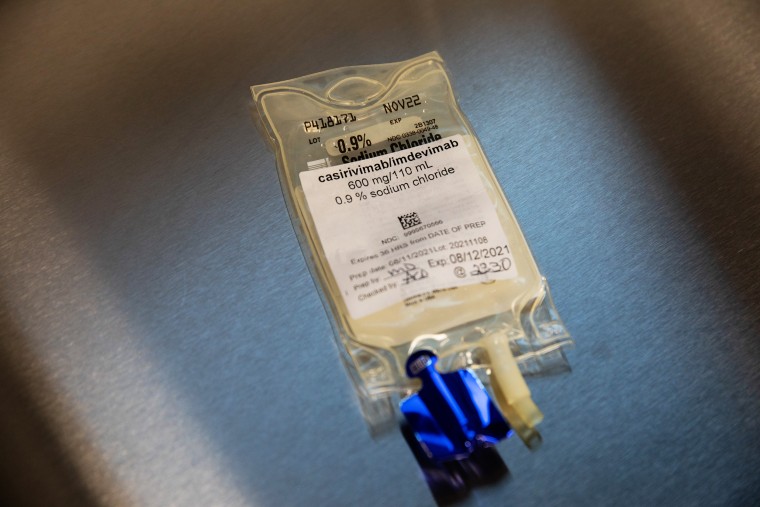Major hospitals in the New York region say they have stopped using monoclonal antibody therapies because they have run out of the one treatment that appears to be effective against the omicron variant of the coronavirus, leaving doctors without a vital tool to treat severely ill Covid-19 patients.
New York University and Valley Health System in northern New Jersey notified doctors Sunday that they are suspending monoclonal antibody programs and will not offer the treatments until they receive more shipments from state and federal health agencies. The hospitals said it was unclear when they will be resupplied.
Meanwhile, Mount Sinai Health System in New York said it would stop offering monoclonal antibodies in its emergency departments. It did not specify whether the policy was a result of supply issues.
Monoclonal antibodies, which are laboratory-made proteins that mimic the immune system’s mechanism for preventing the virus from entering healthy cells, have been used to treat patients at high risk of becoming severely ill from the coronavirus. But only one of the available antibodies — sotrovimab, made by GlaxoSmithKline — appears to be effective against the omicron variant, which accounts for the majority of new Covid cases in the U.S.
Hospitals in other parts of the country say they have very limited supplies of sotrovimab given how new it is, said Dr. Marcus Plescia, the chief medical officer for the Association of State and Territorial Health Officials. He said the organization has been told that supplies will increase significantly over next few weeks as production scales up.
NYU Langone Health told its doctors that as of Sunday they were not able to place orders for monoclonal antibodies and that on Wednesday “we will no longer be offering these monoclonal antibodies infusions to NYU Langone Health patients,” according to a letter obtained by NBC News.
The hospital said that in the “coming weeks” it expects to get a new distribution of sotrovimab from New York state officials but that it will most likely have to limit who gets the doses until the supply increases.
“We anticipate supplies to be severely limited leading us to further restrict [monoclonal antibody] eligibility criteria to include only our most vulnerable patients,” the letter said.
An NYU Langone spokesperson said it is no longer using other monoclonal antibodies to treat Omicron patients because studies have shown them to be ineffective against this variant.
Mount Sinai said Sunday that it was suspending the monoclonal antibody program in its emergency departments because two other monoclonal antibodies — one from Regeneron and the other from Eli Lilly — appear to be ineffective against the omicron variant, which accounts for the vast majority of cases in New York.
"The Mount Sinai Emergency Departments are not offering monoclonal antibody treatment at this time," the hospital said on its website. "As the Omicron variant spreads, we are learning more about it. We are finding that it is passed rapidly from person to person and that most people have mild infections. We are also finding that certain monoclonal antibody treatments are not helpful for patients who become infected with this variant or for post-exposure prophylaxis."
Valley Health System said it was suspending its monoclonal antibody program because of a lack of supply, with no guidance on when treatments would resume.
"We are doing everything we can to obtain more supply and will update everyone as this evolves," the hospital said in a staff email obtained by NBC News.
The federal government paused shipments of all monoclonal antibodies late last month while scientists studied the antibodies' effectiveness against the omicron variant, said a spokesperson for the Department of Health and Human Services.
In recent days, the federal government began distributing 55,000 doses of sotrovimab, with the first shipments set for delivery Tuesday. The doses, the remainder from a federal contract with GlaxoSmithKline, will be distributed to states and hospitals, said Kathleen Quinn, a spokeswoman for the company.
Quinn declined to say how many doses the company has available, citing confidentiality agreements. The company is supplying sotrovimab in several other countries, including the U.K., Japan and Canada, and it has sold 750,000 doses worldwide, Quinn said.
"We are working with urgency and exploring options to expand our supply capacity in 2022 so that we can support more patients," she said.
While the current supply of sotrovimab is “limited,” the Department of Health and Human Services expects more than 300,000 doses to be available next month, a spokesperson said.
In the meantime, some hospitals say they are left with no options for patients. Dr. Stavros Christoudias, a physician at Valley Health and board chair of the New Jersey Doctor-Patient Alliance, said he has a fully vaccinated leukemia patient in desperate need of antibodies, but none are available at his hospital.
“I’m watching people die. I’m watching it,” Christoudias said. “It is happening all over. My PTSD is flaring again.”


